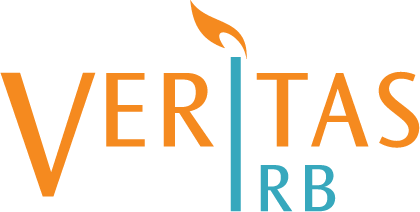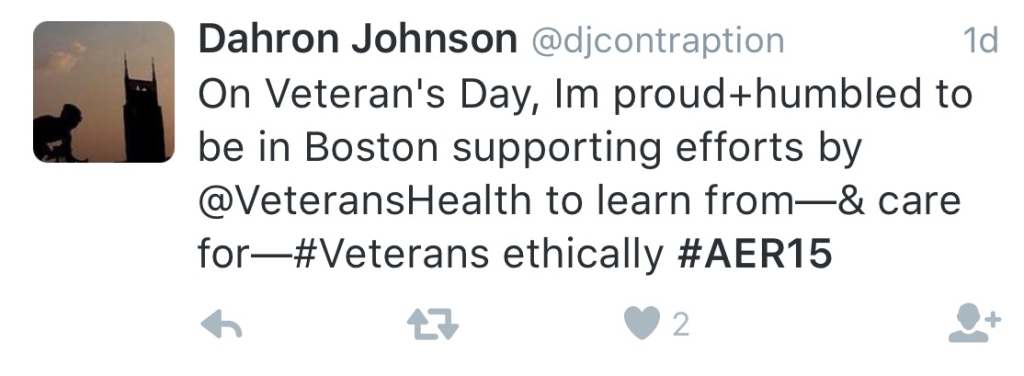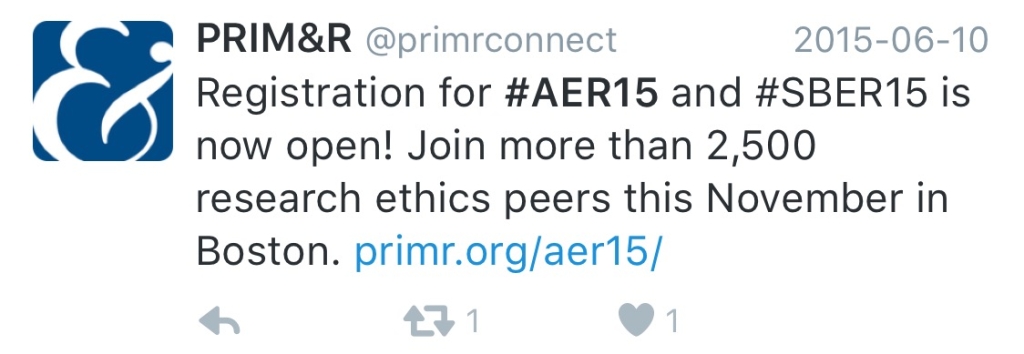As announced earlier this week in our email newsletter, we are all set to begin what should be an exciting conference over the upcoming weekend. Veritas IRB is once again at the PRIM&R AER 2015 conference in Boston. Like the previous years, the conference started with a pre-conference day dedicated to the in-depth exploration of a research ethics topic. The themes were diverse and included IRB/Ethics 101, Biobanking, quality assurance and single IRB administration. Veritas IRB participated to the IRB 101 and biobanking sessions.
IRB/ETHICS 101
Let us start with the basics and jump right into IRB/Ethics 101. This conference was an excellent refresher for those familiar with the field and a great crash course for the rest who are entirely new to the industry. The course itself covered everything from the history and the evolution of ethics review, to a real life simulation of an IRB meeting. The speakers, Susan S. Fish and Susie R. Hoffman, spearheaded the talk with a focus on encouraging questions and some rather thought-provoking words of wisdom.
“Respect for persons, beneficence and justice: the principles that guide our lives” spoke Susie, which evoked a strong sense of empowerment for everyone in the room. “Deciphering who might be treated unfairly during a research study means we have to keep asking questions” was a reality check to those curious about how to review studies involving vulnerable populations. “People underestimate risks involved in things with which they are familiar” drove home the notion that unbiased review and a diversity within the board is of the utmost importance when reviewing a study.
BIOBANKING
Veritas IRB also participated to the pre-conference on biobanking. The conference was very well designed, offering a balance of short sessions followed by panel discussions focusing primarily on biobanks’ structure, operation and governance, research collaborations and disclosure of research results.
The speakers offered some real-life examples of the trials and tribulations of biobanking management. For instance, participants had the opportunity to walk-through the entire process that a clinic uses to secure free & informed consent. The challenges and resources required in order to set up and maintain a biobank, secure consent, and track samples were also discussed from both the perspectives of academic and commercial biobanks.
It is worth noting that, according to the speakers, most biobanks work on a thin margin, which raises concerns about the preservation of the samples in the event of a bankruptcy or lack of funding. Surprisingly, it appears that, still today, most biobanks do not plan their exit strategy.
The discussion surrounding the issue of governance stressed the importance of proper planning to the success of a biobank. Indeed, according to the speakers, “consent to biobanking is in effect consent to a regime of governance”. A biobank should have a vision from the beginning. Elements of good governance were presented to the audience. The IRB plays a key role in the governance of a biobank where it should not only review the biobank’s policy and SOPs at inception but also each individual access requests. Moreover, Biobanks with solid governance are paying more attention to participant engagement. Interestingly, and despite its essential importance, speakers noted that the NPRM’s provisions on biobanking are silent about governance.
Finally, the panel discussed passionately about the role of biobanks with regards to their obligation to disclose to research participants research results as well as unanticipated discoveries made in the course of the research. Betto Ortiz proposed that research results should be disclosed to research participants when such results can lead to medical action. In our opinion, “actionability” as a criterion for disclosure of incidental findings seems more practical than the criteria of “clinical relevance” under NPRM or “material incidental findings” under TCPS2 in Canada. An article on the medical actionability criterion should be relased shortly by Betto Ortiz’s and his colleagues. It will be a definite must read.
In closing on this excellent first day, please find below a selection of our favorite tweets from other PRIM&R participants:






